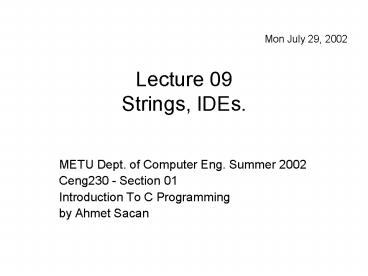Lecture 09 Strings, IDEs. - PowerPoint PPT Presentation
1 / 24
Title:
Lecture 09 Strings, IDEs.
Description:
Lecture 09. Strings, IDEs. METU Dept. of Computer Eng. Summer 2002. Ceng230 - Section 01 ... Write a function that takes an array as input and returns the ... – PowerPoint PPT presentation
Number of Views:59
Avg rating:3.0/5.0
Title: Lecture 09 Strings, IDEs.
1
Lecture 09Strings, IDEs.
Mon July 29, 2002
- METU Dept. of Computer Eng. Summer 2002
- Ceng230 - Section 01
- Introduction To C Programming
- by Ahmet Sacan
2
C String
- is a sequence of one or more characters
terminated by a NULL ( '\0' )character. - The NULL character is crucial in determining the
end of the string.
3
Goal Replay..
- Write a function that takes an array as input and
returns the length of the string.
4
- int strlen(char str )
- int i0
- while (stri ! '\0') i
- return i
int strlen(char str) int i0 while (stri
! '\0') i return i
int strlen(char str) char p
str while(p) p return p - str
int strlen(char str) int i0 while
(stri) return i - 1
5
ltstring.hgt
- size_t strlen(const char s)
- return length of string ( of chars preceding
'\0') - char strcpy (char dest, const char src)
- copies the string src into dest (including
NULL-char) returns dest. - char strcat (char dest, const char src)
- concatenates src to the end of dest, adds NULL at
the end of dest returns dest. - int strcmp (const char s1, const char s2)
- compares strings s1 and s2, returns a negative
value if s1 is lexicographically less than s2
zero if s1 is equal to s2 a positive number if
s1 is greater than s2.
6
- char strchr(const char s, char c)
- returns a pointer to the first occurrence of c in
the string s. (NULL if not found) - char strrchr(const char s, char c)
- returns a pointer to the last occurrence of c in
the string s. (NULL if not found) - char strstr(const char s1, const char s2)
- returns a pointer to the first occurrence of s2
in string s1.
7
- char strncpy (char dest, const char src,
- size_t n)
- copies at most the first n characters of src into
dest. - char strncat (char dest, const char src,
- size_t n)
- concatenates at most n characters of src to the
end of dest. - int strncmp (const char s1, const char s2)
- compares at most max(n, s1.length, s2.length)
characters.
8
- size_t an unsigned integral type defined in
ltstddef.hgt - const char string parameters that are not
modified by the function.
9
- define MAX 32
- char xMAX, yMAX
- printf("d", strlen("hello.")
- printf("s", strcpy(x, "green"))
- printf("s", strcpy(y, strrchr("blue", 'u') ) )
- x2 '\0'
- printf("s", strcat(x, y) )
- printf("s", strcpy(x, y) )
- printf("d", strcmp(x,y) )
- printf("s", strchr("blackwhite", 'w') )
10
Goal
- write your own strcpy(s1, s2) function.
- copies s2 into s1, including NULL-char.
- returns s1
11
- char my_strcpy(char dest, char src)
- char todest, fromsrc
- while(to from)
- to, from
- return dest
char my_strcpy(char dest, char src) char
todest, fromsrc while(to from)
return dest
12
Goal
- Write your own strcat(s1, s2) function
- appends s2 at the end of s1.
13
- char my_strcat (char to, char from)
- strcpy(to strlen(to), from)
- return to
14
Goal
- Write strstr(s1,s2) function that locates the
first occurrence of s2 in s1.
15
- char my_strstr(char str, char find)
- char p
- for(p str p strchr(p, find) p)
- if(!strncmp (p, find, strlen(find))
- return p
- return NULL
16
String Arrays
- char days732
- "Monday", "Tuesday", "Wednesday",
- "Thursday", "Friday", "Saturday",
- "Sunday"
- printf( "s", days2 )
17
- void main()
- char str "flower", p
- int i
- for(p str5 p gt str0 )
- printf("c", p--)
- printf("\n")
- for(p str5, i0 p-i gt str )
- printf("c", (--p - i) )
- printf("\n")
- for(p str5, i0 ilt5 i)
- printf("c", p-i)
- printf("\n")
- for(p str5 p gt str p--)
- printf("c", strp-str )
- printf("\n")
18
Goal int-sort cheat.
- Read student grades (integers 0-100) into an
array, and print in ascending order.
19
Goal buble-sort.
- Write a program that reads a list of floats,
stores them in an array, sorts the numbers in
ascending order, and prints the ordered list.
20
- include ltstdio.hgt
- define MAX_SIZE 1000
- void ReadList(float a , int size)
- void PrintList(float a , int size)
- void BubbleSort(float a , int size)
- void main( )
- int arrMAX_SIZE, size
- ReadList(arr, size)
- PrintList(arr, size)
- BubbleSort(arr, size)
- PrintList(arr, size)
21
- void ReadList(float a , int size)
- int i0
- for( iltsize i)
- scanf("f", ai )
- void PrintList(float a , int size)
- int i0
- for( iltsize i)
- printf("f, ", ai)
- printf("\n")
22
- void BubbleSort(float a , int size)
- int i, unsorted
- float f
- do
- unsorted 0
- for(i0 iltsize-1 i)
- if(ai gt ai1)
- f ai ai ai1 ai1
f - unsorted
- size--
- while(unsorted)
23
Goal SelectionSort
- Write a function that sorts an array of floats
using selection sort algorithm.
24
(No Transcript)






























